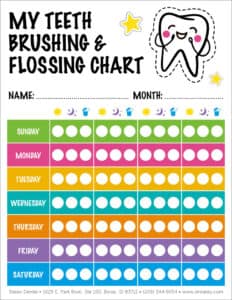How to Help Your Children Love Going to the Dentist

6 Tips for a Positive Pediatric Dental Visit
From the moment they sprout their first baby tooth to the day they smile for their graduation photos, you can see how your children’s smiles are an asset to their physical, psychological, and social well-being. Though as you steer them through the many stages and phases that accompany infancy, childhood, and adolescence, you may be unsure how you can help your children love going to the dentist to keep their smiles strong and healthy.
If visiting the dentist is a challenge for you or your child, rest assured you’re not alone. You can implement a few simple strategies to foster a healthy, lifelong relationship with oral health and dentistry. Here are 6 expert tips you can incorporate before, during, and after your child’s next dentist appointment to help them enjoy dental visits for a lifetime.
1. Opt for a pediatric dentist.
With an additional two to three years of specialized training beyond a degree in general dentistry, pediatric dentists are certified experts in children’s dentistry. Alongside learning about a child’s physical development, pediatric dentists receive extensive training in child psychology. This makes pediatric dentists especially equipped to create an environment that is fun, warm, and welcoming, with a well-developed aptitude for appropriately responding to the behaviors, worries, and needs that may arise for your infant, child, or teen. In other words, even if you’re not quite sure how to respond to your child’s reaction to dentistry, your pediatric dentist and their team are knowledgeable and ready.
2. Examine and care for your own feelings about the dentist.
Have you ever noticed how kids can pick up on the most subtle things? That’s why if you’re one of the millions of Americans who experience dental anxiety, acknowledging and tending to your fears can help your child—and you!—settle into a more positive dental experience.
If bringing your child to the dentist triggers your own anxiety about the dentist, there is no better time than the present to get the support you need. Talk it out with someone you trust, like a partner, therapist, or friend, and inform your child’s pediatric dental team; they can offer expert support and compassionate guidance during your child’s appointment. And perhaps most importantly, try to treat your child’s dental experience as separate from your own and refrain from sharing your worries or negative past experiences with your child. By finding an appropriate and healthy outlet to process your nervousness, you can spare your child from framing the dentist through a lens of fear, dislike, or anxiety.
3. Normalize the dentist through storytime and play.
Storytime and make-believe play are two quintessential kids’ activities that can help make going to the dentist feel normal and safe. Alongside kindling their imagination and social development, storytime and imaginative play provide a vehicle for your child to understand new experiences and process the world around them.
Try introducing one of the many fun and informative children’s books about dentistry (see list below) or playing dentist with your child. For the latter, you can be the dentist and your child can be the hygienist, while one of their toys plays the patient. Have fun as you move through the details of their dental visit, from playing in the waiting room to wearing a “bib” while the dentist and hygienist clean and count their teeth.
Books for Kids on Going to the Dentist
- Dentist (First Time) by Jess Stockham
- Dentist Trip (with Peppa Pig) by Scholastic
- Just Going to the Dentist by Mercer Mayer
- Maisy, Charlie, and the Wobbly Tooth by Lucy Cousins
- Behold, No Cavities!: A Visit to the Dentist (with Spongebob SquarePants) by Sarah Wilson

4. Use communication to your benefit.
From tone of voice to the words you choose, communication is one of the most powerful tools you have available for helping your children love going to their dentist. To start, tell your child they have an upcoming dentist appointment and give them the opportunity to process this with you through questions and sharing. Calm, honest, and positive communication helps create trust and gives your child a safe space to be an active participant in their oral health experience.
Intentionally choosing your words can also help guide your child’s dental experience and expectations before it even begins. For instance, instead of saying, “If you’re good, you’ll get a reward,” say “When you’re done having a good visit with the dentist, you’ll get a reward.”
After the appointment, you can continue to nurture a positive relationship with oral health and dentistry with heartfelt praise, such as celebrating a job well done and complimenting them on their strong, beautiful, and healthy teeth.
5. Create opportunities for independent choices.
Kids often thrive with a healthy dose of age-appropriate independence, which you can indulge via their dental visit. For instance, you can offer them options for how they’d like to be rewarded following a successful dental visit, such as “After you’ve had a good visit with the dentist, would you like to go to Julia Davis Park or Boise Public Library?”
Additionally, if your child has been seeking opportunities to be treated more like a big kid, you can give them space to develop their social skills and self-confidence by stepping out of the exam room during their appointment.
6. Relax!
Parents can feel stressed or nervous about their child’s dental visit for any number of reasons, so know you’re not alone if you’re feeling worked up about your child’s upcoming dental visit. Remember, your pediatric team is only there to give and no one is judging you or your child. Dr. Staley has kids, too, and sometimes even they don’t brush or floss as often as they should!
Practicing self-care—from getting enough sleep to taking a few deep breaths—can go a long way in helping you feel more relaxed and in control before and during your child’s appointment. You can even help your child practice self-care leading up to their appointment with healthy snacks, good hydration, and comfortable clothing.
Oral health is a lifelong journey that is built on small daily habits and healthy lifestyle choices. To help your child develop daily oral hygiene habits, check out our printable chart for kids that encourages daily brushing and flossing. Once all the spaces are filled, you can offer your child a reward for taking such good care of their smile. And to pave the way for your child to have their best oral health and a positive dental experience, contact Staley Dental in Downtown Boise to schedule an appointment.